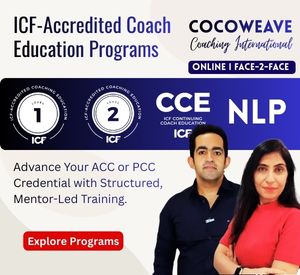Preparing for the ICF Credentialing Exam can feel overwhelming, but with the right approach and mindset, you can set yourself up for success on exam day. Three-quarters of coaches who take the exam pass on the first try. You can, too!
Studying for the exam can be like planning a dream vacation. It takes time to plan where you want to go, identify the must-see sights, and gather all the clothes and accessories you’ll need. You’ll also likely look to others — professionals or peers who have been to the destination before — for advice and insight.
Similar to trip planning it requires a thoughtful approach and tapping into resources and tools, so you’re ready for the big day.
Consider this guide your travel agent or favorite site to find quality online reviews. In it, you will find tips and firsthand experience to help you effectively prepare for the final step in pursuing your Professional Certified Coach (PCC) or Master Certified Coach (MCC) credential. (Are you pursuing the Associate Certified Coach (ACC) credential? Find out more about the ACC Exam.)
Why Earn an ICF Credential? Here’s Why It Matters
Between work, family, and daily responsibilities, the calendar fills up fast, making it feel almost impossible to add studying for an exam. The good news is that your coaching education and coaching experience are an excellent foundation for what you need to know to ace the exam.
ICF credential-holders report that the work and time they committed to preparing for and taking the exam helped them become better coaches. It has pushed them to think about — and, in some cases, re-examine — their own coaching practice.
In an unregulated market where anyone can call themselves a coach, earning an ICF credential provides critical quality assurance for coaching clients. This mark of distinction, recognized as the global gold standard, allows you to distinguish yourself as a coach committed to credibility, competence, and ethical practice.
The ICF Credentialing Exam is one aspect of our dedication to maintaining the integrity of the credentials. It reflects real-life coaching scenarios that coaches worldwide have experienced.
The credentialing exam is created, reviewed, and tested by expert coaching professionals, ensuring that each item is fair, accurate, and valid. It is thoroughly reviewed and updated regularly to ensure it continues to uphold these standards.
Get Ready for Real-World Coaching Scenarios on Exam Day
Much like planning a fun getaway involves researching your destination and packing the appropriate essentials, preparing for an exam means knowing the types of questions you’ll encounter. Understanding how the questions are phrased and how to get to the correct answer will boost your confidence on the day of your exam.
The ICF Credentialing Exam uses situational judgment items designed to assess a candidate’s ability to apply their knowledge and understanding of the ICF Core Competencies, Code of Ethics, and definition of coaching in coaching practice using scenario-based questions. The exam attempts to replicate how coach practitioners engage in their everyday practice.
These items typically include a 150–200-word realistic coaching scenario followed by four response options. You are asked to select the best and worst actions among those provided. Correct answers are identified and validated by your peers — coaching subject matter experts — during the exam development and review process.
Although more than one response may represent a reasonable response to the scenario presented, you will receive credit only for selecting the best possible action or worst possible action. You are asked not to respond with what YOU might do in response to the scenario, but which response is the most effective — in alignment with the ICF Core Competencies and Code of Ethics — and which is the least effective among the four options presented.
Sample Situational Judgment Question
A coach is meeting with a prospective client who is growing a new business. The coach and potential client quickly establish an easy connection. The coach is excited about the opportunity to work with the client. As the coach and client end their conversation, the prospective client briefly mentions the name of their new business. The coach recognizes the business, as the coach is an investor in a more established competitor business in the same community. What should the coach do?
What is the BEST action?
- Not say anything. Try to keep their role as an investor in a competing business separate from their role as a coach.
- Share that the business name sounds familiar and make a mental note to determine whether it is a competitor business later that evening.
- Share their role as an investor in the competitor business only if the potential client follows up to pursue coaching with the coach.
- Share their role as an investor in a competing business and acknowledge the possibility of a conflict of interest with the client.
What is the WORST action?
- Not say anything. Try to keep their role as an investor in a competing business separate from their role as a coach.
- Share that the business name sounds familiar and make a mental note to determine whether it is a competitor business later that evening.
- Share their role as an investor in the competitor business only if the potential client follows up to pursue coaching with the coach.
- Share their role as an investor in a competing business and acknowledge the possibility of a conflict of interest with the client.
Review additional situational judgment sample questions.
7 Essential Study Tips
Becoming credentialed will be challenging, but it is worth it. With preparation, you can pass the ICF Credentialing Exam! Using these study tips and links to resources will give you the confidence to take the exam and earn your credential.
- Take advantage of ICF’s resources to help you prepare for the exam. These resources include candidate guides, videos, checklists, and sample questions
- Ask another coach who has recently taken the exam about their experience and what they found useful in preparing for the exam.
- Practice with a mentor, conduct mock coaching sessions with another individual preparing to take the exam, and talk about applying the core competencies in real-world scenarios.
- Review sample questions and practice exams if available.
- Review the training materials for the accredited coaching program you’ve completed and focus on areas where you feel less confident.
- Don’t make assumptions or add details that are not directly presented when reading the scenario.
- Try to discern which core competency each scenario represents. The exam is designed to test your understanding of the ICF Core Competencies. Think about which core competency the question is focusing on, as this will help you identify the best and worst actions.
Remember: The four responses presented may not reflect what you would do. Instead, find which of the four responses most and least aligns with the ICF Core Competencies and Code of Ethics.
How to Apply for Your ICF Credential
Applying for a credential is like planning excursions for your vacation. You must know what the activity might require, how to participate, the time to set aside, attire or gear expectations, or even prior experience.
Completing the ICF Credentialing Exam is one of the final steps in the process. After meeting coach-specific educational requirements and acquiring documented client experience and mentor coaching hours, you can begin a credential application by completing the Credential Path Survey. Once your application is reviewed, you will receive notice if you are approved to take the ICF Credentialing Exam, with the option to complete it either in person or online.
Take the Next Step in Your Coaching Career
Remember, the ICF Credentialing Exam is not just a test of knowledge but also of your ability to apply coaching principles in real-world situations. Approach your preparation holistically, combining theoretical study with practical application and self-reflection.
Most of all, be confident in your abilities and the training you’ve received. With thorough preparation and a calm mindset, you’ll be well-equipped to pass your exam and take the next step in your coaching career.
Start your credential application or schedule your exam today if approved to do so.
Disclaimer
The views and opinions expressed in guest posts featured on this blog are those of the author and do not necessarily reflect the opinions and views of the International Coach Federation (ICF). The publication of a guest post on the ICF Blog does not equate to an ICF endorsement or guarantee of the products or services provided by the author.
Additionally, for the purpose of full disclosure and as a disclaimer of liability, this content was possibly generated using the assistance of an AI program. Its contents, either in whole or in part, have been reviewed and revised by a human. Nevertheless, the reader/user is responsible for verifying the information presented and should not rely upon this article or post as providing any specific professional advice or counsel. Its contents are provided “as is,” and ICF makes no representations or warranties as to its accuracy or completeness and to the fullest extent permitted by applicable law specifically disclaims any and all liability for any damages or injuries resulting from use of or reliance thereupon.
Authors
Post Type
Blog
Audience Type
Coach Educators, Experienced Coaches, External Coaches, ICF Chapter Leaders, Internal Coaches, New Coaches, Professional Coaches, Team and Group Coaches
Topic
Coaching Toolbox, Discover - Your Coaching Career
Related Posts
The Power of Active Listening in Meaningful Coaching: Why Active Listening is the Most Essential Coaching Competency
Of all the foundational coaching competencies identified by the International Coaching Federation…
Allyship in Action: Coaching as a Catalyst for Change
Allyship is often framed as a value or an intention. In practice,…
Grace Under Fire: Building Stress Resilience for Coaches and High Achievers
There’s a unique kind of pressure that lives at the intersection of…







